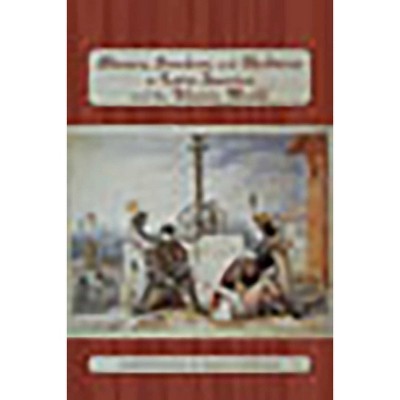The Souls of Purgatory - (Diálogos) by Nancy E Deusen (Paperback)

$29.95 when purchased online
Target Online store #3991
About this item
Highlights
- This translation of part of the diary of a 17th century Peruvian mystic includes the convent life of slaves and former slaves and baroque Catholic spiritual experiences from the perspective of a woman of color.
- Author(s): Nancy E Deusen
- 221 Pages
- Biography + Autobiography, Religious
- Series Name: Diálogos
Description
About the Book
This translation of part of the diary of a 17th century Peruvian mystic includes the convent life of slaves and former slaves and baroque Catholic spiritual experiences from the perspective of a woman of color.Book Synopsis
This translation of part of the diary of a 17th century Peruvian mystic includes the convent life of slaves and former slaves and baroque Catholic spiritual experiences from the perspective of a woman of color.Review Quotes
"This book is fascinating...a valuable asset to colonial Latin American Literature."
"This book offers fascinating insight into the Roman Catholic Church's role in the 17th-century slave trade and its harsh views of race and gender. As for de Jess, she comes across as a woman of great wisdom and deep spirit who never turned bitter but who embraced the power of a greater humanity through an unshakeable faith. Her story should be read and savored."
Dimensions (Overall): 9.02 Inches (H) x 6.04 Inches (W) x .69 Inches (D)
Weight: .77 Pounds
Suggested Age: 22 Years and Up
Number of Pages: 221
Genre: Biography + Autobiography
Sub-Genre: Religious
Series Title: Diálogos
Publisher: Unm Press
Format: Paperback
Author: Nancy E Deusen
Language: English
Street Date: September 15, 2004
TCIN: 88976511
UPC: 9780826328281
Item Number (DPCI): 247-56-9517
Origin: Made in the USA or Imported
If the item details above aren’t accurate or complete, we want to know about it.
Shipping details
Estimated ship dimensions: 0.69 inches length x 6.04 inches width x 9.02 inches height
Estimated ship weight: 0.77 pounds
We regret that this item cannot be shipped to PO Boxes.
This item cannot be shipped to the following locations: American Samoa (see also separate entry under AS), Guam (see also separate entry under GU), Northern Mariana Islands, Puerto Rico (see also separate entry under PR), United States Minor Outlying Islands, Virgin Islands, U.S., APO/FPO
Return details
This item can be returned to any Target store or Target.com.
This item must be returned within 90 days of the date it was purchased in store, shipped, delivered by a Shipt shopper, or made ready for pickup.
See the return policy for complete information.











